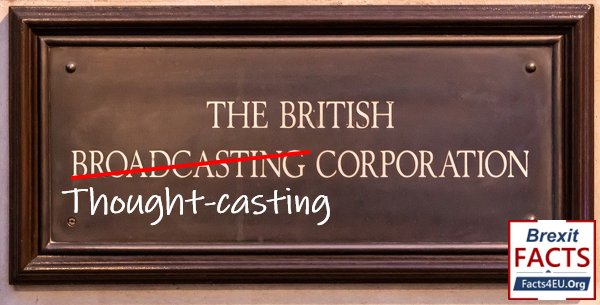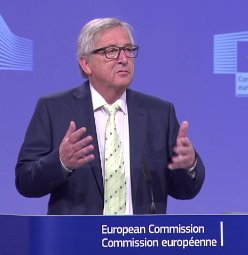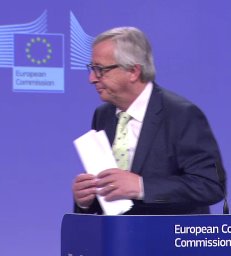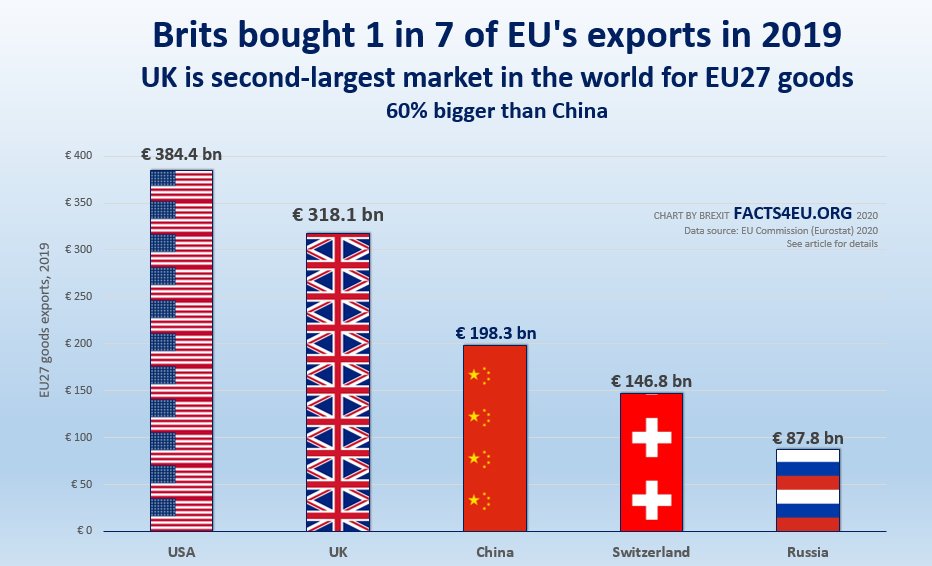“The EU is not setting out to punish the UK in trade talks,” says BBC
“Oh really?” says Brexit Facts4EU.Org. “Where have you been for the last four years?”

© Brexit Facts4EU.Org 2020
We take the BBC to task and put the record straight, with facts
Correcting the BBC about BrexitPart One of a series of three articles demonstrating the EU's bad faith in negotiating with the United Kingdom
The full series:-
Part One - Fact 1 (this article) | Part Two - Facts 2-6 | Part Three - Facts 7-10
This article forms Part One of a three-part series. In this Part One we summarise the BBC’s position and the basic facts which contradict it, and provide our first piece of evidence.
In Part Two and Part Three we will provide more chapter and verse in factual form to back up all the other the assertions we make below. We hope readers will find this useful in rebutting some of the continuing claims made by die-hard Remainers. Facts are facts.
This series of articles is not only about BBC bias
This short series will also form a record of the lack of goodwill and good faith displayed by the EU during the negotiations for the UK’s exit from the EU and the subsequent ‘trade talks’. As such it forms part of the case which could be used by the UK Government for the rescinding and voiding of the Withdrawal Agreement and Political Declaration.
The BBC's love of the EU
“Self-interest is also - contrary to the belief of some in the UK - the reason the EU is not setting out to punish the UK in post-Brexit trade talks.”
On Monday 09 Nov 2020, the above was published by a Remainer organisation which readers may have heard of, called the BBC. It was written by their ‘Europe Editor’, Katya Adler.
The BBC’s position seems to be that the EU has not acted in an adversarial way towards the UK, and has not sought to punish the British people for voting to leave their organisation.
When Ms Adler says “contrary to the belief of some in the UK”, she is talking about people like us, and probably the vast majority of our readers. In the interests of balance, we must therefore publish the following facts, all of which we have reported on before, and all of which are in the public domain.
Brexit Facts4EU.Org Summary
10 key facts which show how the EU set out to punish the British people
- Fact 1 – From Day One the EU made it perfectly clear that it would punish the UK
- Fact 2 – EU banned UK from speaking to member states and delayed start of talks by a year
- Fact 3 – Numerous hostile announcements have been made by the EU and leaders of member countries
- Fact 4 – EU banned discussion of trade until Withdrawal Agreement was signed
- Fact 5 – EU insisted on three arbitrary items to be agreed before trade talks could start
- Fact 6 – EU weaponised and endangered the Belfast Agreement, threatening peace in Northern Ireland
- Fact 7 – Northern Ireland Protocol has the effect of colonising part of the sovereign territory of the UK
- Fact 8 – EU still claims UK territorial waters as its own, or no trade deal
- Fact 9 – For the vast majority of the time, the EU has made the “trade talks” about other issues
- Fact 10 – Demands of the EU Commission and Parliament are unprecedented in any Free Trade Agreement
The evidence for our 10 points
In this article we will publish our evidence in support of 'Fact 1' above, showing that the EU machine has acted with ill-will and hostile intent towards the United Kingdom starting from Day One, in direct contravention of its Treaty obligations.
In Part Two to be published on Saturday (14 Nov 2020) we will provide factual and incontrovertible evidence for more of the points above, concluding with a final part on Sunday.
Fact 1 – Evidence - From Day One the EU made it perfectly clear that it would punish the UK
On the morning after the EU Referendum, EU Commission President Jean-Claude Juncker gave an interview to the German TV channel ARD and also gave an EU press conference in Brussels.
1.1 Interview with German TV channel ARD, 24 June 2016:
“This is not an amicable divorce.”
- Jean Claude Juncker, EU Commission President, 24 June 2016
Readers will note that President Juncker did not employ the future tense, nor did he suggest any doubt by using a word such as 'might' or 'could'. This was a declaration. Given that President Juncker had had no contact with the UK Government at this point, his statement was clearly one of hostile intent, not a reaction to anything said or done by the British Government.
1.2 Press conference, Brussels, same day:
Herr Juncker started with: “Ladies and gentlemen and - for some of you - dear friends….”
The EU Commission President commonly used the term 'Dear friends' when addressing a room. The clear implication of his qualification on this occasion - "and for some of you" - was that any British people in the room were no longer friends.
He then announced that a meeting had already taken place earlier that morning at the highest levels to discuss “the situation we are in after the British people expressed its views on their… er… [long pause...] next situation.” Readers will note that speaking ad lib like this, President Juncker could not even bring himself to utter the words “decision to leave the European Union”. Instead he refers to the British people’s “next situation”.

The angry walkout
When asked a question by a journalist about the implications of Brexit for the EU as a whole, Jean-Claude Juncker abruptly closed his papers and angrily walked out of the press conference.
And the journalist who prompted Herr Juncker’s petulant departure? Why, none other than Katya Adler, the same BBC Europe Editor who is now telling the British public that the EU is not setting out to punish the UK. What’s more, Ms Adler has been witness at first hand to numerous subsequent examples of the anger and hostility exhibited by the EU over the many years since the Referendum result was declared.

In Part Two (to be published on Saturday 14 Nov 2020) we will provide factual and incontrovertible evidence for the other nine points above.
The EU has had over four years to agree a future relationship – how have they behaved overall?
The EU has had four years and four months to agree a future trading relationship with its second-largest market for goods exports: the United Kingdom. Last year (2019) this was worth €318.1 billion to the EU27 – a sum 60% higher than the EU’s sales to its third-largest customer: China.
© Brexit Facts4EU.Org - click to enlarge
It might be thought that the EU would have been keen to secure this trade with the United Kingdom on an ongoing basis. Given that the EU hasn’t shown such willingness or enthusiasm, it is clear there are other factors in play.
Observations
This is about impartial journalism and the BBC, not about Ms Adler
We do not single out Ms Adler for special criticism. She is mainstream BBC and should not be demonised in any way on an individual basis. The problem of anti-Brexit bias in the BBC is endemic, not personal. This is not about Ms Adler alone, but about the rotten edifice which is BBC News and Current Affairs.
The BBC is a state-funded and licence fee-funded broadcasting organisation and has a statutory duty of impartiality. By contrast, Brexit Facts4EU.Org receives no funding from the government and we do not even sit behind a paywall. Readers can enjoy our work for free every week. All we can do is ask for voluntary donations from the public. (Quick, secure, and confidential donation links are below this article, and we badly need your help to continue our work.)
Impartiality isn’t that difficult
If we wished, members of the Facts4EU.Org team would be perfectly capable of writing and presenting balanced pieces covering both sides of the argument, as the BBC should do.
After years of observing the anti-democratic and sclerotic EU - and its avowed desire to subsume all member countries to create one superstate - we made the decision to present the case for independence for the UK. This was an argument won across the entire country on 23 June 2016, when the majority of the British people backed our stance in the largest democratic vote in British history.
The BBC’s anti-Brexit bias is endemic
Over four years later, it seems that the nation’s state broadcaster is still populated with those who believe in the Establishment’s view that the UK should become part of a United States of Europe.
If anyone is in any doubt, we recommend reading the output of the highly-respected News-Watch, run by David Keighley. Their latest report, “The BBC and Brexit - the BBC’s coverage of Brexit and the EU, July 2020” is well worth studying.
Root and branch reform of the BBC is needed. Those in the BBC who wish to embrace impartiality should stay. Those who don’t, might perhaps be advised to seek alternative employment where news and facts take second place to opinions. We would prefer a BBC which can be trusted to impart news and facts in an objective manner.
PART TWO – Please do not miss Part Two of this piece on Saturday, where we provide more detailed evidence for the assertions in our summary above.
[ Sources: BBC | EU Commission ] Politicians and journalists can contact us for details, as ever.
Brexit Facts4EU.Org, Thur 12 Nov 2020
Click here to go to our news headlines
Please scroll down to COMMENT on the above article.
And don't forget to actually post your message after you have previewed it!
Since before the EU Referendum, Brexit Facts4EU.Org
has been the most prolific researcher and publisher of Brexit facts in the world.
Supported by MPs, MEPs, & other groups, our work has impact.
We think facts matter. Please donate today, so that we can continue to ensure a clean Brexit is finally delivered.
Paypal Users Only - Choose amount first
Quick One-off
Monthly



Something to say about this? Scroll down for reader comments